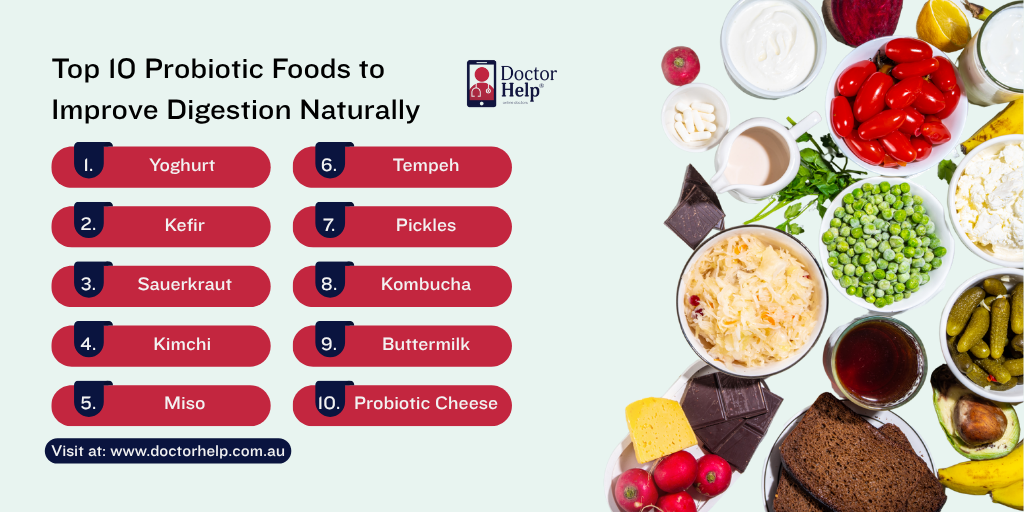Table of Contents
Are you bloated after meals, sluggish in the afternoon, or think your gut is simply against you? This is a sign that your gut might be needing some reinforcements. Introducing probiotic foods to the diet is one of the easiest, most natural means of assisting digestion.
Probiotics are healthy bacteria living organisms that assist in maintaining a balance in your digestive system. They work with your body not against it and help with symptoms such as bloating, irregular bowel movements, and also maintain Immune Health.
Let’s take a real, science-backed look at 10 of the best probiotic foods you can eat to naturally improve digestion, plus how to make them part of your daily routine.
What Are Probiotics and Why Do They Matter?
Probiotics are living microorganisms that, when consumed in the right amounts, offer a health benefit, especially to your gut. According to Healthdirect Australia, they help restore the natural balance of gut bacteria, particularly after disruptions like antibiotics, illness, or a poor diet.
When paired with prebiotics, the fibre that feeds good bacteria, you’re giving your digestive system the ultimate support team.
Read: Gut Health 101: How To Heal Your Gut Naturally
Top 10 Probiotic Foods to Improve Digestion
Here are the most effective foods that contain probiotics you can start enjoying today:
1. Yoghurt (Live Culture)
Let’s start with a classic. Probiotic yogurt is rich in Lactobacillus and Bifidobacterium strains, which can help regulate bowel movements and improve lactose digestion.
Look for labels that say “live cultures” or “active probiotics.” Skip the sugary versions, they can counteract the benefits.
2. Kefir
Kefir is like yoghurt’s cooler, more fermented cousin. The product is a probiotic drink that is prepared by fermenting milk with kefir grains, which contains up to 30 strains of strong probiotics in a single serving.
Studies at the National Library of Medicine show that kefir can reduce inflammation in the gut and enhance digestive wellbeing.
3. Sauerkraut
Fermented cabbage may not sound too exciting, but there is a reason why sauerkraut is a powerful probiotic for gut health. It is high in fibre and probiotics, which can help feed the microbiome diversity.
Make sure to buy unpasteurised versions–the heat from pasteurisation kills beneficial bacteria.
4. Kimchi
Kimchi is a fermented cabbage, radish, and garlic spiced up. It is a Korean staple. It contains multiple biome probiotics and has been linked to improved digestion and immune modulation.
It’s also high in antioxidants and fibre, making it a strong contender in the probiotic league.
5. Miso
Known to be a common ingredient in Japanese cuisine, miso is a fermented grain and soybean paste. It is a source of probiotics that is rich in protein as well as containing minerals and vitamins.
Just do not boil it, or its live cultures will be killed, and you can consume it in the soup or as a brush – for whatever you will need.
6. Tempeh
Tempeh is an outgrowth fermented soybean, which has a great deal of probiotics as well as protein in it. It also includes vitamin B12 that is scarce in plant based foods.
Its texture is meaty, so it serves as an excellent food source of meat items, which vegetarians can consume and a digestive health functional food.
7. Pickles (Naturally Fermented)
Not all pickles are probiotic-rich, only naturally fermented ones are. That means no vinegar – just brine, salt, and time.
They contain lactic acid bacteria that support digestion, especially when consumed with fibre-rich meals.
8. Kombucha
Kombucha is a popular (evidence-based) probiotic drink fermented, fizzy tea. It contains loads of nutritious yeasts and bacteria and some of these strains can aid in reducing inflammation of the gut.
Look out on the label to avoid those containing a lot of sugar or that are added to different flavours.
9. Buttermilk (Cultured)
Traditional cultured buttermilk (not the stuff used in baking) is another great probiotic dairy food. It contains Lactococcus and other strains that support gut flora balance and reduce inflammation.
Drink it straight or mix into dressings or smoothies for a tangy boost.
10. Probiotic Cheese
Other aged cheeses such as gouda, mozzarella and cheddar retain live cultures. However, they do not include as many probiotics as yoghurt or kefir but they are a delicious addition to your microbiome.
Also read: Balanced Diet For A Healthy Lifestyle
Nutrition Australia reminds us that not all fermented foods contain active live cultures, and some may be a high sodium food or contain added sweeteners so when selecting probiotic foods or drinks, it is very important to check the label to know you are getting real value to your gut microbiome.
In Australia, probiotic food safety and labelling are monitored by Food Standards Australia New Zealand (FSANZ), which provides appropriate information to the consumers about the live cultures and ingredients used.
Pairing With Prebiotics: The Ultimate Combo
To get the most from probiotic foods, pair them with prebiotic fibre – the fuel your gut bacteria need to thrive.
Some top prebiotic foods include:
- Garlic
- Onions
- Asparagus
- Oats
- Bananas
Together, prebiotics and probiotics form a symbiotic relationship that strengthens your digestion naturally.
What About Probiotic Supplements?
Whole foods should be your first stop, but probiotic supplements can help if:
- You’re recovering from antibiotics
- You have IBS or IBD
- You’re travelling or under high stress
Look for TGA-approved brands in Australia with:
- At least 1 billion CFUs
- Multiple strains
- Shelf-stable packaging
Remember that the influence of probiotics may differ among people and rely on consumed strains. All probiotics are not equal in their efficacy, thus it is worthwhile to take the appropriate one to suit your needs.
Consult your GP, accredited dietitian health provider before you introduce probiotic supplements, especially if you have underlying health conditions or are pregnant.
Are Probiotics Safe for Kids?
Yes, probiotics for kids are generally safe when food-based. Yoghurt, kefir, and fermented veggies can support immunity and digestion, especially during or after antibiotics.
However, always consult a health professional before giving probiotic supplements to children.
To End it All: Gut-Friendly Lifestyle
One of the simplest and least harmful methods to take care of your digestive system and feel lighter and more energetic is to incorporate probiotic foods into your daily diet. Whether you’re sipping kombucha, adding sauerkraut to a salad, or enjoying probiotic yogurt for breakfast – small changes create big shifts over time.
You don’t need to overhaul your life. Just pick a couple of these powerful probiotics, mix them in regularly, and let your gut thank you.
Speak with a trusted Australian doctor and book an appointment with us today to receive personalised gut health advice.
References:
- Healthdirect Australia. (n.d.). Probiotics. Healthdirect.
https://www.healthdirect.gov.au/probiotics - Saleem, G. N., Gu, R., Qu, H., Khaskheli, G. B., Rajput, I. R., Qasim, M., & Chen, X. (2024). Therapeutic potential of popular fermented dairy products and its benefits on human health. Frontiers in Nutrition, 11.
https://doi.org/10.3389/fnut.2024.1328620 - Clinic, C. (2025, June 17). Health benefits of kimchi. Cleveland Clinic.
https://health.clevelandclinic.org/is-kimchi-good-for-you - Subali, D., Christos, R., Givianty, V., Ranti, A., Kartawidjajaputra, F., Antono, L., Dijaya, R., Taslim, N., Rizzo, G., & Nurkolis, F. (2023). Soy-Based tempeh rich in paraprobiotics properties as functional sports food: more than a protein source. Nutrients, 15(11), 2599.
https://doi.org/10.3390/nu15112599 - Marsh, A. J., O’Sullivan, O., Hill, C., Ross, R. P., & Cotter, P. D. (2013). Sequence-based analysis of the bacterial and fungal compositions of multiple kombucha (tea fungus) samples. Food Microbiology, 38, 171–178.
https://doi.org/10.1016/j.fm.2013.09.003 - Leeder, T. (2022, March 8). Love your guts | Nutrition Australia. Nutrition Australia.
https://nutritionaustralia.org/fact-sheets/love-your-guts/














